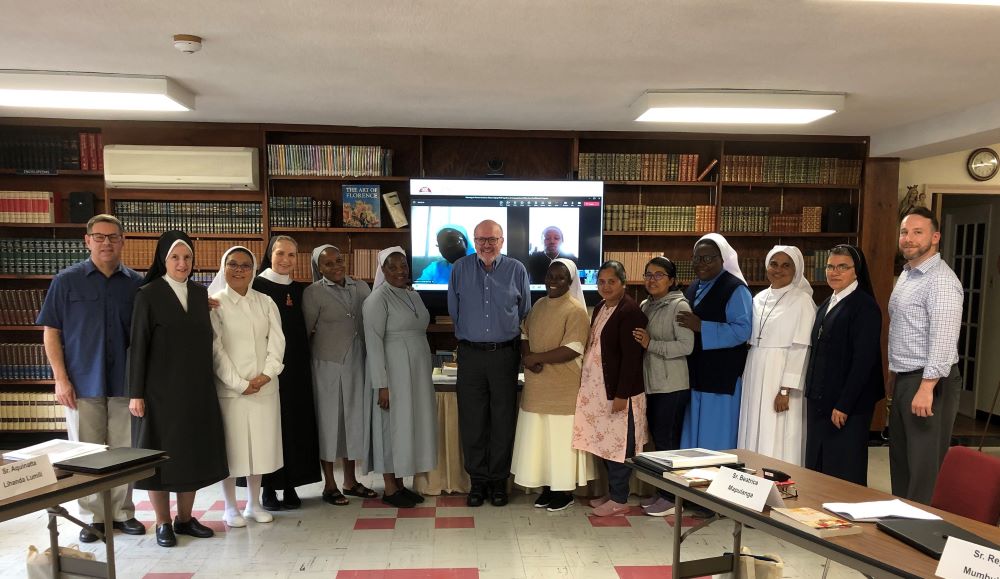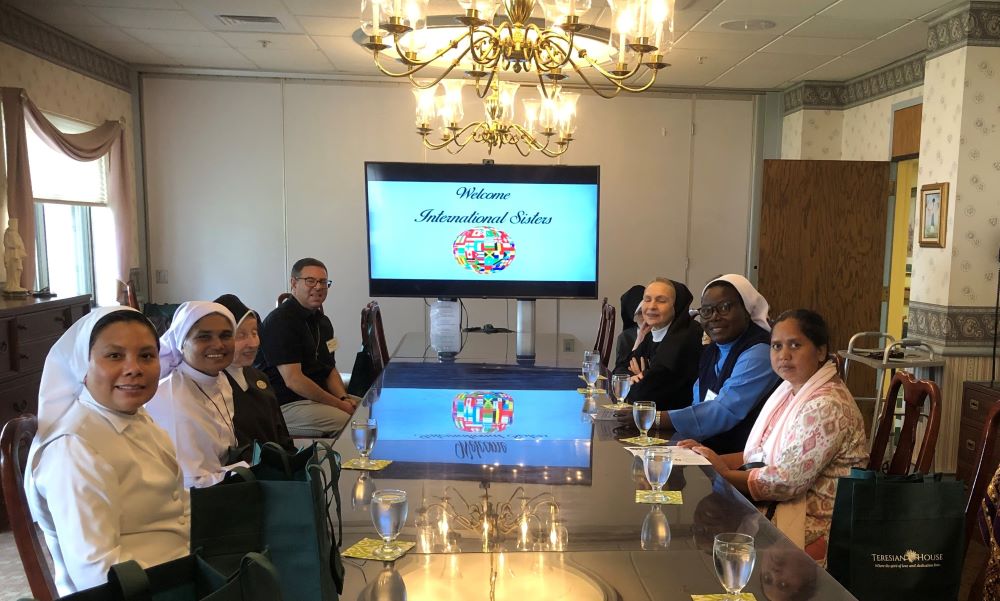Participants of the summer program organized by Carmelite Sr. Peter Lillian DiMaria and staff of the Avila Institute of Gerontology work on a team building project. (Courtesy of Avila Institute)
As the person in charge of coordinating all health care services in a province of more than 250 sisters, Zambian Sr. Regina Mumbuluma Mulenga, of Little Servants of Mary Immaculate, already has a many-faceted, challenging job.
When she returns home, she said, she's determined to pass on the many things she's learned in the Avila Institute of Gerontology's program, "Sisters Aging Well Together," to her colleagues who work one-on-one with elderly members in the community houses scattered around their province. That includes, she said, medical details about abnormal brain aging, spiritual care; and practical details, like reconfiguring bathrooms to make them easier for older sisters to use.
Mulenga said she's also enjoying the time she's spending with sisters from other parts of the world. "We're learning a lot from one another."
Funded by the Conrad N. Hilton Foundation, the 18-month pilot program is providing sisters in countries including Kenya, India, Mexico, Zambia and Ghana ways to assess the health of their communities, to identify aging-related concerns, and to approach them directly. No two international sisters are from the same community. (The Conrad N. Hilton Foundation also funds Global Sisters Report.)
Advertisement
The program includes a separate conference for 30 sisters in the United States. These sisters will gather again for virtual meetings later this year to discuss further strategies for assessment and implementation. Additional cohorts will attend sessions scheduled for October in Marriottsville, Maryland, and Darien, Illinois.
"By the time we're finished, we hope to have at least 100 sisters from different congregations who will have benefited by getting a geriatric certificate through the program," said Carmelite Sr. M. Peter Lillian Di Maria, Avila Institute director. Registration is still open, and scholarships are available, she said.
Virtual classes for the international sisters launched in March. In July, they arrived in the United States for an intensive program for almost a month, including a time of in-person observation at St. Patrick's Manor in Framingham, Massachusetts, a home sponsored by the Carmelite Sisters for the Aged and Infirm.
Program sessions tackled topics that include how to distinguish normal from abnormal aging, person-centered care for the elderly, nutrition, spiritual care, how sisters can keep finding meaning in their lives as they age, and grieving. The program also covered nuts-and-bolts topics like health care proxies and power of attorney, and navigating care transitions.
As the staff develops programs at Avila, they are very conscious, Di Maria said, that "religious life is lived a bit differently than lay life." When creating a program, she said, "you're developing it so it allows a religious to still be a religious," with elements like building in prayer time and allowing for the emotional complexity of being part of an extended family of sisters (in addition to birth families).
"The reality," DiMaria said, "is they are already doing this" as they take care of their sisters. But "Aging Well" provides more training, helping them enhance their skills and knowledge.
Sr. Sophy Therese Kallupalathingal Matthew, a member of the Daughters of Mary, is an administrator who runs St. Joseph, the nursing home hospital for her province, in Tamil Nadu, India. With more than 60 elderly sisters in her province, this program was "a precious chance" to learn how to manage medical conditions like Alzheimer's and Parkinson's diseases, she said.
Like many participants, Sr. Lauren VanDermark, a Sister of St. Joseph of Carondelet based in Albany, New York, had many years' experience working with the elderly. A social worker by profession, she had spent 25 years working as a local director of aging services for Catholic Charities before her community asked her to provide social work services for elderly sisters living at the provincial house.
She was drawn to "Aging Well" by its holistic, team-based approach to care. "Every member of that team is important to providing a culture of aging successfully," she said. She also appreciated the way experts and Avila staff gave practical demonstrations of how to use the resources provided, so that participants were able to practice them.

Religious sisters from the countries of Kenya, India, Mexico, Zambia, and virtually from Ghana, participated July 12-28 in a program organized by Carmelite Sr. Peter Lillian Di Maria and staff of the Avila Institute of Gerontology at St. Patrick's Manor in Framingham, Massachusetts, a home sponsored by the Carmelite Sisters for the Aged and Infirm. (Courtesy of Avila Institute)
Sr. Elizabeth Kovacs, a member of the Sisters of Christian Charity who attended the program with the superior at her motherhouse, is a nurse practitioner who serves as the administrator of the order's nursing wing at their motherhouse in Mendham, New Jersey. While she feels fortunate that her community is able to house elderly sisters in their own facility, she said, "we don't have a ton of sisters who would be qualified for this position. And everyone is aware of that."
As part of the program, Kovacs will write a reflection paper on what she learned and deploy a lengthy assessment tool Avila has developed for her entire province. When Avila gets that information, which includes demographic, financial and her community's current health care needs, they will provide a three-year projection of future needs and help the Sisters of Charity develop a strategic implementation plan.
"I was out of my seat excited, because this can only benefit my community," Kovacs said. "And it's all free."
Di Maria expressed her appreciation to the Hilton Foundation for their support of the pilot program, adding that it was instrumental in enabling sisters who wouldn't otherwise have been able to participate to attend.
"I am extremely grateful for what we have been able to accomplish thus far with the Hilton Foundation's aid, and I am hopeful that the prospect of sustained funding will enable us to extend our reach to a multitude of additional congregations around the world," she said.
Feedback from participants has been very positive, she said.
One of the most beneficial aspects of the program, Kovacs said, was "networking with sisters of other communities, and finding out that we have very similar challenges. The essence of wanting to care for our elderly members, to give them the best we can in their final years, is very consistent across the board." The American sisters will continue to stay in touch with one another, she added.

Participants of the summer program organized by Carmelite Sr. Peter Lillian DiMaria and staff of the Avila Institute of Gerontology get ready for a tour of the Teresian House, a facility staffed by the Carmelite Sisters of the Aged and Infirm. (Courtesy of Avila Institute)
A hospital chaplain trained as a neonatal nurse practitioner, Congregation of Notre Dame Sr. Janet Lawrence also provides pastoral care for 14 sisters who live in a public apartment building in Bridgeport, Connecticut. She appreciated the opportunity to share, with other sisters, what it means to see health care as a ministry — one in which they co-partner with aging sisters, helping them to live as fully as they can, even in the final stages of their lives, she said.
"It was very powerful for me, for everybody, to hear other sisters coming at this in their different cultural settings."
As a medical professional, she said, she already knew something about the medical aspects of aging. But from a social work and a spirituality of aging perspective, "this conference was very exciting for me."
As they return home, the international sisters in this cohort will create their own teams, working in cooperation with their superiors, who are in the process of establishing eldercare networks in their communities. They will bring with them a multifaceted assessment tool Avila developed for evaluating care, with the hope that eventually they will be able to teach not only their own communities, but sisters in other religious communities. Sisters in some countries, Di Maria said, are finding ways to collaborate across congregational boundaries.
"The vision is to have this training throughout the world for all communities," Di Maria said.
In foreign countries, sisters are often directly responsible for caring for other sisters, though sometimes they serve alongside laypeople. U.S. sisters, who may rely on lay staff, will also be able to modify the assessment plan to make it appropriate for lay care and supervision.
As they evaluate their work, Avila staff is considering building in a future in-person meeting with the foreign sisters in the United States to assess how they are implementing the tools they have been given.
It seems clear, from their comments, that participants in the United States and abroad gleaned a lot from their participation thus far. But what about the experts who helped lead it?
Di Maria said she was impressed by the dedication visiting sisters showed to the elder members of their community, as well as focus, persistence against obstacles and thirst for knowledge.
Avila Institute's head of education Shane Cooney added that he has learned that "the power of community is just as important as the power of the education they are receiving. No one can take on this challenge on their own. The strength, dedication, and ability of this group to make positive changes in their communities will make all the difference in the future."






